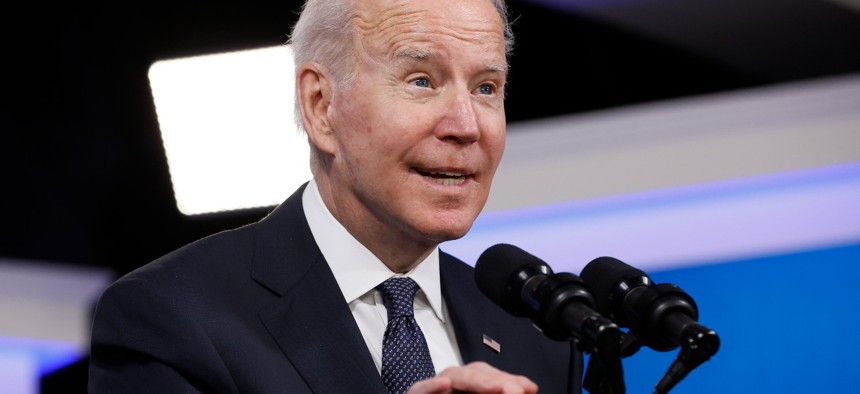
Chip Somodevilla/Getty Images
Biden’s ‘A-Team’ Turnover Shows ‘Return to Normalcy,’ Report Finds
Staff’s professional experience and transition efforts were likely stabilizing factors.
Turnover among President Biden’s “A-team” during his first year in office was lower than that for his predecessors, which was likely due to the staffers’ experience and transition efforts, according to a new study.
Kathryn Dunn Tenpas, a nonresident senior fellow with Governance Studies at the Brookings Institution, published an analysis on Thursday––the one year anniversary of President Biden’s Inauguration––about turnover in the administration in its first year. This was a massive issue under the previous administration.
“The Biden administration’s first-year turnover was one of the lowest of the past six administrations and may reflect the influence of experience and a professional transition operation,” Tenpas wrote in the report. “Staff turnover in the Biden administration represents a return to normalcy or a regression to the mean as statisticians like to think of it.”
The study primarily focused on the president’s “A-team,” which consists of the most senior staff within the Executive Office of the President (a small number of which require Senate confirmation). Tenpas included more detailed information about the sample in the report. Turnover is defined as a vacancy that is a result of promotion, resignation or firing.
The chart below shows the level of turnover among the “A-teams” for Biden and his six most recent predecessors. Biden’s turnover level (8%) was the third lowest as only presidents George H.W. Bush and George W. Bush had lower rates, at 7% and 6%, respectively.

Biden’s 8% represented five departures from his “A-team” out of 66 positions, which is “suggestive of a highly stable staff,” said Tenpas. They all left for different reasons. For example, TJ Ducklo, deputy press secretary, had a forced resignation less than a month after inauguration after inappropriate behavior toward a reporter. In another instance, Julissa Reynosa Pantaleon, chief of staff to First Lady Dr. Jill Biden, was confirmed by the Senate to be the U.S. Ambassador to Spain. Tenpas pointed out that even a low rate of turnover can be disruptive, however.
The Biden team’s relative stability can most likely be attributed to the vast public service experience of these officials (although that does not completely insulate them from missteps) and the “professionalism and efficiency,” during the transition despite the delay in “ascertainment” or the official start to the transfer of power, Tenpas said. Going forward, historical precedent shows that departures increase in a president’s second year, she noted.
For comparison, “in stark contrast, President Trump lost three senior staff members within the first three weeks in office, and nine additional A-Team members by August 2017,” wrote Tenpas. “Of the 12 Trump departures, five came from the National Security Council, suggesting that it was undergoing serious restructuring. By the end of the first year, Trump’s first-year turnover grew as high as 23 A-Team departures.”
Separately, the nonprofit Partnership for Public Service and The Washington Post are tracking 798 major positions that require Senate confirmation of the approximate 1,200. As of Friday afternoon, 141 had no nominee; six were awaiting formal nomination, 190 were being considered by the Senate and 269 had been confirmed by the Senate. The tracker includes all full-time, civilian positions in the executive branch that need Senate confirmation, but does not include judges, marshals and U.S. attorneys.
Tenpas noted at the end of her report there have been “two curious vacancies” during Biden’s first year in office: director of the Office of Management and Budget and the administrator of the Office of Information and Regulatory Affairs, which is a division of OMB.
While Biden did nominate Neera Tanden to be OMB director, she withdrew her nomination in early March after much opposition. Not until late November did Biden nominate Shalanda Young, deputy OMB director who is serving as acting director, to be director. As for OIRA administrator, there haven’t been any nominees.
NEXT STORY: The Hill Gets Serious About Digital Services







